Ghana's oil production is in full swing, and measures must be put in place at every stage of the process to maximize the benefits. Can new digital technologies play a role?
--
Penplusbytes recently hosted a 48-hour hackathon, dubbed "Hack4Oil," to stimulate ideas, technologies and innovative solutions to enhance government-citizen engagement and improve governance of Ghana's nascent oil and gas industry. The Accra event focused on three thematic areas—accountability and transparency, policy and regulation, and environment and health.
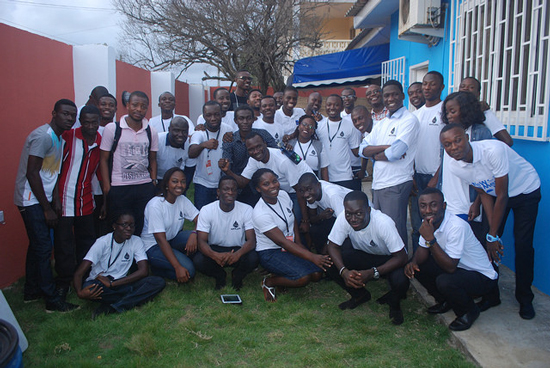
Dr. Frimpong, an advisor at Petroleum Commission-Ghana, led participants through the Petroleum and Local Content Regulation of 2013, inviting developers to learn about the sector and find creative solutions to its challenges. He and other presenters kicked off the event with speed talks on a variety of topics. Speakers included Kwami Ahiabenu II of Penplusbytes, Jim Cust of the Natural Resources Governance Institute (NRGI), Benjamin Boakye of the Africa Centre for Energy Policy (ACEP), Edwin Ametsikor of the Ghana Wildlife Society, Edem Agbe of STAR-Ghana, Barnabas Owusu of the West Africa AIDS Foundation, and Nana Ama Yirrah of the Community Land and Development Foundation.
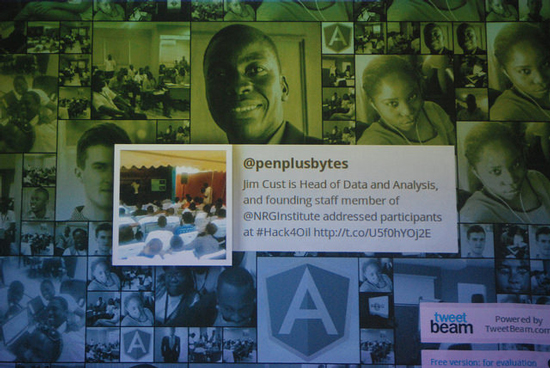
Next, a crop of young and talented programmers, analysts and developers from Meltwater Entrepreneurial School of Technology, CODERYTE, ISTECH Ghana, the University of Cape Coast and Ashesi University interacted with extractive sector stakeholders to identify challenges.
Ibrahim Abubakar, a developer from the University of Cape Coast, said that technology could help Ghana avoid the missteps that Nigeria and other oil-rich countries have made. "I see a lot of problems in the oil industry, and I think the public needs a lot of information. Technology will help us get the information to the public more efficiently and effectively," he said.
Priscilla Hazel, a developer from MEST and a newcomer to extractive sector issues, called the hackathon "an interesting and welcome challenge."
"I signed up for Hack4oil because I wanted to be part of something that helps find solutions to revenue management challenges in the oil and gas sector," she said.
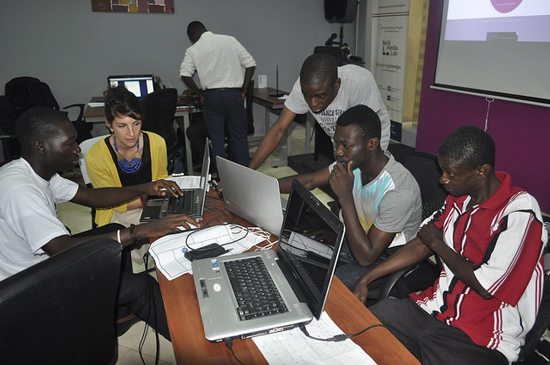
Let the hack begin
The stage was set for hacking to begin with eight teams—Infoil, Mekasa, IWitness, Oil Journey, IDDL, Greenlight, Planeteers, and Global. Five groups of mentors helped participants build what said David Salassie Opoku, a mentor, called "relevant, context-specific solutions."
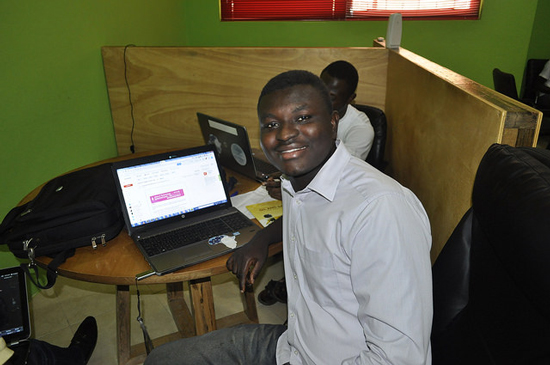
After hours of hacking, the panel of judges made up of Ekua Odoom, Teemu Ropponen, Edward Tagoe, William Sam and Rayborn Bulley declared Oil Journey's David Alhassan Mumuni, Alfred Ayitey Ayi-Bontey and Abideen Adelu the winning team. Their prototype not only lets citizens monitor and review the application of oil revenues by subscribing to and receiving information by SMS and voice system, but it also lets them have a say in which development projects the oil money should fund. The voice system is developed in local languages to give citizens access to information, regardless of their literacy levels. [See Oil Journey's website for more information on the winning project.]
Teams Infoil and Planeteers took the 2nd and 3rd prizes respectively. Infoil developed a prototype to aid monitoring and accessing the use of oil revenue, while the Planeteers focused on a prototype that gives local communities and advocacy groups a channel to identify and report the impact of oil and gas activities on marine ecology.
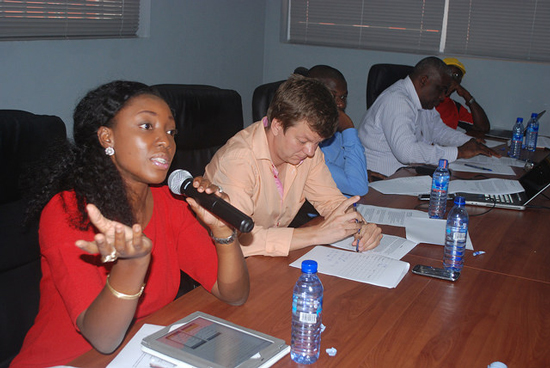
Hack4Oil, the first hackathon to focus on Ghana's oil and gas sector, created needed buzz to drive ideas, technologies and innovations. Teemu Ropponen, director of iLab Liberia and a judge called the event "brilliant, with a very high turnout and very high quality of people."
"The emerging substance was amazing," she said. "The judges asked the teams to focus and think about [specific] problems and not try to solve everything—so narrow and deep, rather than broad and shallow…. My expectations were definitely met."
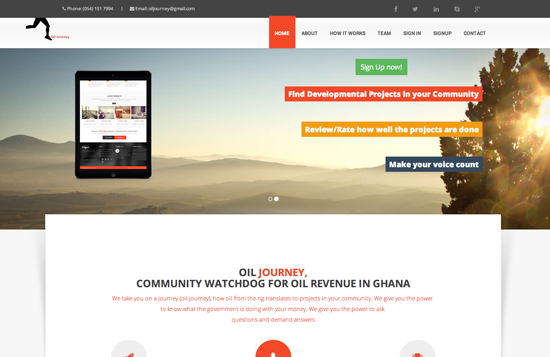
Kwami Ahiabenu II is the president of the International Institute for ICT Journalism, also known as PenPlusBytes, based in Accra. The organization works in partnership with NRGI and ACEP, with support from STAR-Ghana.

Participants of Ghana's first hackathon for oil and gas governance included developers from the countries' top universities and schools of technology. Photo by PenPlusBytes

With instruction from global experts, including NRGI's Jim Cust via Skype from London, Hack4Oil participants tackled extractive sector governance challenges using innovative technology. Photo by PenPlusBytes
Ibrahim Abubakar, a developer from the University of Cape Coast, said that technology could help Ghana avoid the missteps that Nigeria and other oil-rich countries have made. "I see a lot of problems in the oil industry, and I think the public needs a lot of information. Technology will help us get the information to the public more efficiently and effectively," he said.
Priscilla Hazel, a developer from MEST and a newcomer to extractive sector issues, called the hackathon "an interesting and welcome challenge."
"I signed up for Hack4oil because I wanted to be part of something that helps find solutions to revenue management challenges in the oil and gas sector," she said.

Eight teams worked with mentors to develop "relevant, context-specific solutions" during the two-day competition in Accra. Photo by PenPlusBytes
The stage was set for hacking to begin with eight teams—Infoil, Mekasa, IWitness, Oil Journey, IDDL, Greenlight, Planeteers, and Global. Five groups of mentors helped participants build what said David Salassie Opoku, a mentor, called "relevant, context-specific solutions."

MEST developer David Mumini, with teammates Alfred Ayi-Bontey and Abideen Adelu, designed a winning submission that uses SMS technology to track oil and gas revenues and expenditures. Photo by PenPlusBytes
Teams Infoil and Planeteers took the 2nd and 3rd prizes respectively. Infoil developed a prototype to aid monitoring and accessing the use of oil revenue, while the Planeteers focused on a prototype that gives local communities and advocacy groups a channel to identify and report the impact of oil and gas activities on marine ecology.

Ekua Odoom, Teemu Ropponen and other judges looked for specificity as they identified winning solutions. Photo by PenPlusBytes
"The emerging substance was amazing," she said. "The judges asked the teams to focus and think about [specific] problems and not try to solve everything—so narrow and deep, rather than broad and shallow…. My expectations were definitely met."

The top team, Oil Journey, will receive seed funding and mentoring to develop their winning concept.
--
International Institute for ICT Journalism
www.penplusbytes.org
www.penplusbytes.org
No comments:
Post a Comment